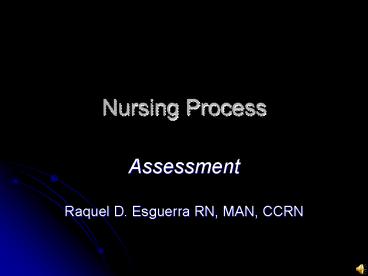Nursing Process - PowerPoint PPT Presentation
1 / 22
Title:
Nursing Process
Description:
10 items Medical Terminology (Matching type) 10 items ... Medical Terminology. Most common suffix, prefix. Dosage & Calculation. Temperature Conversion ... – PowerPoint PPT presentation
Number of Views:48
Avg rating:3.0/5.0
Title: Nursing Process
1
Nursing Process
- Assessment
- Raquel D. Esguerra RN, MAN, CCRN
2
(No Transcript)
3
(No Transcript)
4
Overview of the Nursing Process
5
Characteristics of the Nursing Process
- Data from each phase provides input to the next
phase (cycle, dynamic, constantly changing) - It is client centered
- It is an adaptation of problem solving and
systems theory. Parallel but separate from the
process used by physicians. The medical process
focuses on physiologic systems and disease
processes, whereas the nursing process is
directed towards a clients responses to disease
and illness - Decision making is involved in every phase of the
nursing process. Facilitates individualization
of the nurses plan of care
6
Assessment
- Assessing is a systematic and continuous
collection, organization, validation, and
documentation of data (information) - Data must be
- relevant
- collected
- documented
7
Purpose of Assessment
- To establish a database concerning a clients
physical, psychosocial and emotional health in
order to identify health promoting behaviors as
well as actual and/or potential health problems.
8
Types of Assessment
- Initial assessment
- Problem-focused assessment
- Emergency assessment
- Time-lapsed assessment
9
Assessment
10
(No Transcript)
11
Sources of Data
Types of Data
Data Collection
Data Collection Methods
12
Data Collection
- The process of gathering information about a
clients health status - Database all the information about the client
which includes - Nursing health history
- Physical assessment
- Physicians history and health examination
- Results of lab. diagnostic tests
- Past history current medical problems
13
Types of Data
- Objective data or overt data are signs
detectable by an observer, can be seen, heard,
felt, smelled and they are obtained by
observation or physical examination - Examples discoloration of skin, BP reading
- Subjective data or covert data are symptoms
that are apparent only to the person affected and
can be described or verified only by that person - Pain, anxiety
14
(No Transcript)
15
Sources of Data
- Client
- Support People
- Client records
- Health care professionals
- Literature
16
Data Collection Methods
- Observing
- Interviewing
- Approaches
- Directive
- Nondirective
- Types of interview questions
- Open-ended questions
- Neutral question
- Leading question
- Planning the interview
- Time
- Place
- Seating arrangement
- Distance
- language
- Examining
17
- Non
- Nursing
- Models
- Body Systems Model
- Maslows hierarchy of Needs
- Develop-mental Theories
- Nursing
- Conceptual
- Models
- Gordons Functional Health Patterns
- Orems Self-care Model
- Roys Adaptation Models
Organize Data
18
Clarify
Make a comparison
Avoid inferences
Validate Data
Double check data
Use references
Consider all factors
19
Accurate
Timely
Complete
Document Data
Legible
Accepted Terminology
Concise
20
Exam 2
- 8 items Legal Aspects of Nursing
- 9 items Values, Ethics, Advocacy
- 8 items Critical Thinking, Assessing
- 5 items Dosage Calculation
- 10 items Medical Terminology
- (Matching type)
- 10 items True/False
21
Study Guide
- Legal Aspects
- Sources, Types of Laws
- Informed Consent
- Impaired Nurse
- Six Elements of Nursing Malpractice
- Legal Responsibilities for Students
- Values, Ethics, Advocacy
- Personal vs. Professional Values
- Values of Nursing
- Steps to Clarify Values
- Moral vs. Ethical Values
- Making Ethical Decisions
- Advocacy
- Critical Thinking, Assessing
- Case Scenarios
- The Nursing Process
- Assessment
- Medical Terminology
- Most common suffix, prefix
- Dosage Calculation
- Temperature Conversion
- Grams-mg-mcg
- Ml tsp tbsp
- Formula for dosage Calculation
22
At the end of each chapter-
- Read Chapter Highlights
- Study Review Questions
- Explore Media Links































